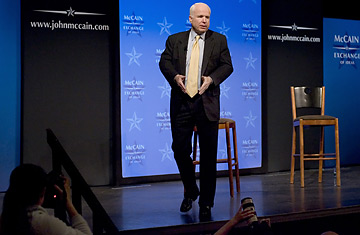
Presidential hopeful Senator John McCain speaks at a fundraiser in New York, March 8, 2007.
George W. Bush and his allies have always thought that, in hindsight, their February 2000 loss in the New Hampshire primary was a blessing in disguise. His turnaround following that defeat proved that the front-running Texas Governor didn't have a glass jaw, that he was more than a political heir relying on name recognition alone. Today it's John McCain, the man who handed Bush that defeat and is now the nominal G.O.P. establishment candidate in the 2008 Presidential election, who has to prove he can bounce back from a humbling early defeat.
That's because the results of the first virtual primary of the 2008 cycle came in Sunday and Monday, and they amounted to a roundhouse kick to the head of McCain. One of his main primary opponents, Mitt Romney, shattered prior fundraising records, pulling in $20.5 million between Jan.1 and March 31, while McCain did just $12.5 million over the same period. That even placed McCain third behind former New York City mayor Rudy Giuliani, who took in $15 million. "We had hoped to do better," said McCain campaign manager Terry Nelson.
It is hard to see where McCain can turn for good news in these numbers. The secondary figures are not yet in for the G.O.P. candidates, but already Romney's campaign is predicting they will have a healthy "burn rate" — a measure of how much money raised actually gets saved for future campaign expenses. A Romney campaign source says that of the money they took in last quarter they expect to bank around the same amount McCain earned in total. McCain's office declined to say what it expects its burn rate to be, but its expenses have been considerable, with the Senator traveling aggressively over the last three months.
Fundraising numbers in and of themselves are not absolute indicators of a campaign's health and viability, and McCain's personal response now becomes crucial: how does he bear himself in public; what does he say to his backers in private; and can he give the impression of resolution in the face of adversity. His campaign says they intend to bounce back. "All campaigns are going to face challenges," one McCain staffer said. "We recognize ours, and we're taking steps to address them."
McCain has brought in former Texas Senator Phil Gramm to help with fundraising, and the campaign says they intend to improve the organization of group fundraising, or "bundling," and to hold accountable those responsible for the campaign's finances if they don't deliver. McCain himself wasn't well positioned to respond to the release of the numbers Sunday: he was traveling in Iraq, defending his continued support for the war there.
